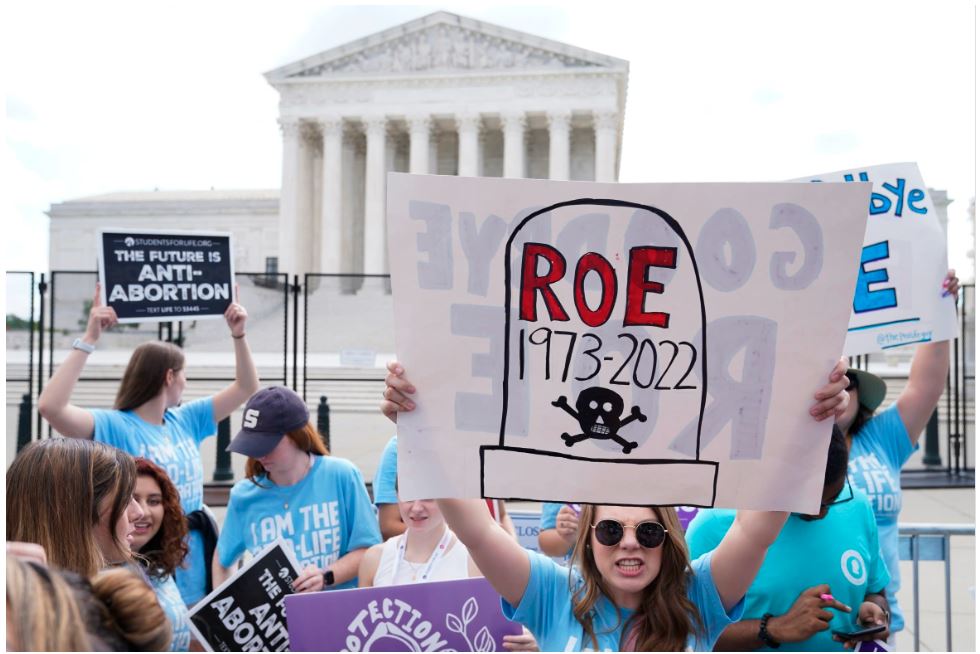US companies that will cover travel costs for employees getting abortions could be exposed to criminal liability, according to legal experts.
Last Friday, the US Supreme Court overturned the 1973 Roe v. Wade ruling that legalized abortion and upheld a Mississippi law that bans abortion after 15 weeks.
Amazon.com Inc, Apple Inc, Lyft Inc, Microsoft Corp, and JPMorgan Chase & Co were among companies that announced plans to provide those benefits through their health insurance plans.
Conde Nast, Walt Disney Co, Cigna Corp, Paypal Holdings Inc, Alaska Airlines Inc, and Dick's Sporting Goods Inc announced reimbursement policies.
If businesses adopt policies that support employees getting abortions, they will have to navigate the patchwork of state laws and risk angering anti-abortion organizations and Republican-led states.
Texas state legislators have already threatened legal action against Lyft and Citigroup Inc, both of which had previously announced travel reimbursement policies.
The lawmakers also presented a number of abortion-related bills, one of which would prevent businesses from operating in Texas if they pay for women living there to have abortions elsewhere.
Companies will probably soon be sued by states or anti-abortion activists who claim that payments related to abortions violate state laws prohibiting the facilitation or aiding and abetting of abortions, says University of Illinois law professor and expert on healthcare law, Robin Fretwell Wilson.
States are not allowed to enact regulations prohibiting to employer-sponsored health plans under the Employee Retirement Income Security Act of 1974 (ERISA). That language has been interpreted by courts for decades to preclude state regulations that specify what health plans must and must not cover.
Any company sued over an abortion travel reimbursement requirement will likely cite ERISA as a defense, according to Katy Johnson, senior counsel for health policy at the American Benefits Council, a trade group.
However, fully-insured health plans, in which employers purchase coverage through a commercial insurer, are regulated by state law and not ERISA.
Furthermore, ERISA does not preclude states from enforcing criminal laws, such as the laws in a number of states that make it illegal to aid and abet abortions.



 U.S. Vaccine Policy Shifts Under RFK Jr. Create Uncertainty for Pharma and Investors
U.S. Vaccine Policy Shifts Under RFK Jr. Create Uncertainty for Pharma and Investors  Tencent Shares Slide After WeChat Restricts YuanBao AI Promotional Links
Tencent Shares Slide After WeChat Restricts YuanBao AI Promotional Links  Fed Governor Lisa Cook Warns Inflation Risks Remain as Rates Stay Steady
Fed Governor Lisa Cook Warns Inflation Risks Remain as Rates Stay Steady  FDA Fast-Tracks Approval of Altria’s on! PLUS Nicotine Pouches Under New Pilot Program
FDA Fast-Tracks Approval of Altria’s on! PLUS Nicotine Pouches Under New Pilot Program  South Korea Assures U.S. on Trade Deal Commitments Amid Tariff Concerns
South Korea Assures U.S. on Trade Deal Commitments Amid Tariff Concerns  Gold and Silver Prices Rebound After Volatile Week Triggered by Fed Nomination
Gold and Silver Prices Rebound After Volatile Week Triggered by Fed Nomination  Oil Prices Slide on US-Iran Talks, Dollar Strength and Profit-Taking Pressure
Oil Prices Slide on US-Iran Talks, Dollar Strength and Profit-Taking Pressure  Global PC Makers Eye Chinese Memory Chip Suppliers Amid Ongoing Supply Crunch
Global PC Makers Eye Chinese Memory Chip Suppliers Amid Ongoing Supply Crunch  U.S. Stock Futures Slide as Tech Rout Deepens on Amazon Capex Shock
U.S. Stock Futures Slide as Tech Rout Deepens on Amazon Capex Shock  Uber Ordered to Pay $8.5 Million in Bellwether Sexual Assault Lawsuit
Uber Ordered to Pay $8.5 Million in Bellwether Sexual Assault Lawsuit  Trump Signs Executive Order Threatening 25% Tariffs on Countries Trading With Iran
Trump Signs Executive Order Threatening 25% Tariffs on Countries Trading With Iran  Newly Released DOJ Epstein Files Expose High-Profile Connections Across Politics and Business
Newly Released DOJ Epstein Files Expose High-Profile Connections Across Politics and Business  Federal Judge Restores Funding for Gateway Rail Tunnel Project
Federal Judge Restores Funding for Gateway Rail Tunnel Project  Novo Nordisk and Eli Lilly Cut Obesity Drug Prices in China, Boosting Access to Wegovy and Mounjaro
Novo Nordisk and Eli Lilly Cut Obesity Drug Prices in China, Boosting Access to Wegovy and Mounjaro  China Extends Gold Buying Streak as Reserves Surge Despite Volatile Prices
China Extends Gold Buying Streak as Reserves Surge Despite Volatile Prices 































